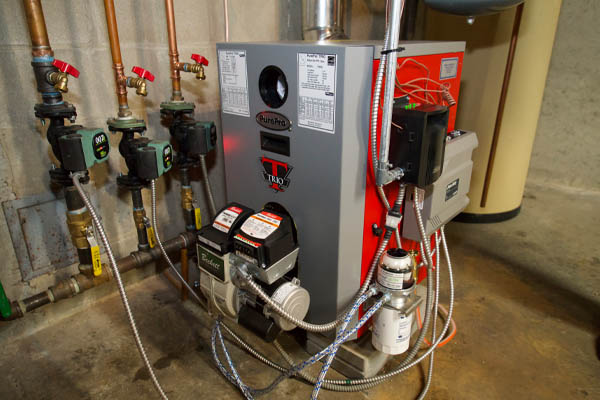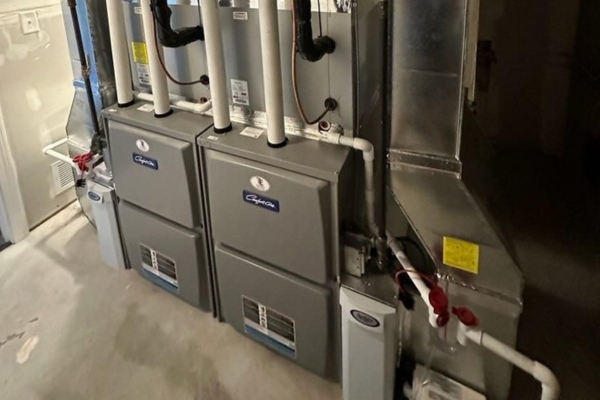Contents
- Understanding the Key Variations Between Boiler Systems and Forced-Air Furnaces
- Boiler: Advantages and Disadvantages
- Furnace: Advantages and Disadvantages
- Frequently Asked Questions About Furnaces and Boilers
- What is the Recommended Frequency for Servicing My Boiler or Furnace?
- What Indications Suggest My Boiler Requires Repairs?
- Is It Possible to Boost the Efficiency of My Current Furnace or Boiler?
- What Factors Should I Evaluate When Selecting a New Furnace or Boiler?
- What Safety Precautions Should I Take with Furnaces and Boilers?
- Conclusion
- Contact Taylor Energy For Superior HVAC Services
It’s easy to see why many homeowners might mix up boilers and furnaces. Both are essential for heating homes or buildings. However, their similarities essentially stop there. Each system operates quite differently and offers unique benefits, making the choice between them dependent on specific heating needs and the existing infrastructure. Understanding the distinctions and advantages of each can significantly influence your decision when selecting an appropriate heating system for your home. In this article by Taylor Energy, we discuss the differences between a boiler vs. furnace.
Understanding the Key Variations Between Boiler Systems and Forced-Air Furnaces
This section outlines the critical distinctions between these two types of heating systems.
Defining a Boiler

A boiler is a substantial, sealed unit where water or another liquid is heated to produce steam or vapor. It is a central element in many heating setups, pivoting between emitting heat and effectively distributing it.
Hydronic heating, also known as radiator systems, utilizes water or another liquid for heat generation. In addition to the boiler, this system includes various components such as baseboards, radiators, pipes, and circulator pumps. These elements are strategically installed throughout different rooms and areas to facilitate efficient heat distribution. The complexity and number of components in a residential boiler system can vary widely, depending on the home’s size and the number of rooms it encompasses.
Rely on Taylor Energy for Comprehensive Heating Solutions: Whether you need installation services or repairs, Taylor Energy is dedicated to ensuring your heating system operates flawlessly. Reach out to us today!
Defining a Furnace
A furnace operates as a heating system that utilizes air to generate warmth. Often referred to as a “forced-air heating system,” it takes in cool or room-temperature air, pushes it through a heat exchanger to warm it up, and then channels the heated air through an HVAC ductwork system for distribution across different rooms. Furnaces come in horizontal, upflow, and downflow configurations and can be powered by oil, electricity, gas, or induction heating technologies.
Contrasting Boilers and Furnaces
The fundamental distinction between a boiler vs. furnace lies in their operational methods. A boiler heats water within a tank or container, creating warmth. This hot water is then circulated through pipes extending throughout the house or building. As the hot water flows, it heats the pipes, radiating heat to warm the surrounding spaces. A boiler can maintain warmth in a building if it continues producing hot water or steam.
In contrast, a furnace employs a heat exchanger to warm air rather than fluid or water. A blower motor propels this heated air throughout the home, which forces the air through vents and ductwork to distribute warmth effectively.
Boiler vs. Furnace: Comparing Energy Efficiency

Heating air requires more energy compared to heating water. Consequently, furnaces tend to use more fuel over a shorter period than boilers. In terms of initial investment, boilers generally have a higher cost but can offer greater durability than furnaces. Naturally, the longevity and efficiency of either unit also hinge on regular and proper maintenance.
Boost Your Home’s Heating Efficiency with Taylor Energy: Enhance your home’s comfort with Taylor Energy. Contact us today to discover our energy-efficient heating solutions! Call now!
Boiler: Advantages and Disadvantages

We will explore the benefits and drawbacks linked with using a boiler.
Pros
- Efficiency: Generally, boilers are more fuel-efficient in producing heat, leading to lower energy costs for homeowners.
- Less Noise: Since boilers heat water rather than air, they do not require fans to push air through the system, making them quieter than furnaces.
- Heat Consistency: The heat generated from hot water or steam in boilers is more uniform compared to the hot air from furnaces.
- Air Quality: Boilers do not circulate air throughout your home, thus avoiding the distribution of dust, pollen, and other airborne particulates.
Boost Your Home’s Heating Efficiency with Taylor Energy: Enhance your home’s comfort with Taylor Energy. Contact us today to discover our energy-efficient heating solutions! Call today!
Cons
- Limited to Heating: Boilers are designed solely for heating and cannot cool your home. While furnaces also lack cooling capabilities, their existing ductwork can easily integrate with a central cooling system.
- Installation Complexity: Installing a boiler is generally more complex and time-consuming.
- Slow Temperature Adjustment: Boilers respond slowly to thermostat changes, taking time to adjust the heating temperature.
- Risk of Leaks: Older or poorly maintained boilers pose a higher risk of leaking, potentially causing water damage.
- Conversion Challenges: Transitioning from a boiler to a furnace system is difficult and costly due to the necessary ductwork installation.
Furnace: Advantages and Disadvantages

This section outlines the benefits and drawbacks of utilizing a furnace.
Pros
- Flexibility: Furnaces are versatile, using various energy sources such as electricity, natural gas, heating oil, and propane. While models powered by solar or geothermal energy are available, they are less common.
- Fast-Acting: Furnaces have the ability to heat up more quickly than boilers, allowing them to warm a home in a shorter amount of time.
- Cost: Their commonality makes furnaces widely available, leading to a greater market selection of units and models. This abundance helps to lower the overall cost.
- Minimal Leaks: If a furnace were to leak, it would release air rather than water or fluid, significantly reducing the potential for damage to the home.
- Zero Freezing Hazard: In colder climates, homes with furnace-based heating systems avoid the risk of frozen and potentially bursting pipes, which is associated with boilers that use water for heating.
Experience the Comfort with Taylor Energy: Don’t let the chill get to you. Contact Taylor Energy for professional heating solutions and services. Call now!
Cons
- Noise Levels: Furnaces’ blowers create noise as they distribute air throughout the home. This sound is noticeable each time the furnace activates.
- Inconsistent Heating: The nature of heated air leads to uneven temperatures, often resulting in some rooms feeling warmer or cooler than others.
- Dependent on Air Quality Maintenance: Indoor air quality can diminish if the furnace’s air filters are not regularly maintained or replaced.
Frequently Asked Questions About Furnaces and Boilers

Here are some common questions and answers to help you understand more about furnaces and boilers.
What is the Recommended Frequency for Servicing My Boiler or Furnace?
It is advisable to have your furnace or boiler serviced once a year, preferably before the onset of the heating season. Consistent maintenance promotes efficient performance, extends the unit’s lifespan, and helps avoid unforeseen malfunctions.
What Indications Suggest My Boiler Requires Repairs?
Signs that your boiler needs servicing include unusual noises such as banging, whistling, or gurgling, water leaks around the unit, reduced heating efficiency, or fluctuating water temperatures.
Is It Possible to Boost the Efficiency of My Current Furnace or Boiler?
Absolutely, regular maintenance, enhancing your home’s insulation, sealing any leaks in the ductwork or piping, and using a programmable thermostat for more effective heating control can improve the efficiency of your furnace or boiler.
Prepare for Winter with Taylor Energy: Make sure your home remains warm and inviting this winter. Contact Taylor Energy now for top-notch heating services! Call now!
What Factors Should I Evaluate When Selecting a New Furnace or Boiler?
When selecting a new furnace or boiler, it’s important to consider the type of fuel it uses, its energy efficiency (seek out high AFUE ratings for furnaces and high AFUE or thermal efficiency ratings for boilers), the size that is suitable for your home, and any available rebates or incentives for energy-efficient models.
What Safety Precautions Should I Take with Furnaces and Boilers?
Safety is of utmost importance when dealing with heating systems. Always have your furnace or boiler installed and periodically inspected by certified professionals. Be vigilant regarding the dangers of carbon monoxide poisoning by installing detectors near these units. Additionally, ensure that safety valves and emergency shut-offs are operational to avoid accidents.
Conclusion
Deciding between a boiler vs. furnace primarily hinges on your specific heating and cooling requirements, as well as the current infrastructure of your home. If you’re considering upgrading from an old system, it’s encouraging to know that the latest models of both boilers and furnaces offer high-efficiency ratings, leading to significant long-term savings. If you’re still unsure about the best system for your needs, consulting with a professional HVAC contractor can provide you with expert guidance.
Contact Taylor Energy For Superior HVAC Services
Taylor Energy provides top-notch heating and cooling services across Northern Connecticut. Our team comprises highly qualified technicians, each professionally certified to deliver outstanding HVAC tune-ups, repairs, installations, and replacements. They bring extensive knowledge and experience to ensure your system functions flawlessly.
At Taylor Energy, we pride ourselves on offering the most affordable rates for heating and cooling services in the region. Our maintenance services are crafted to enhance your comfort and increase energy efficiency, ultimately lowering your heating and cooling expenses. If you require an HVAC repair or need to choose a new system, our experts will guide you to the best solution that fits your budget.
We stand behind our work with a solid satisfaction guarantee. Call Taylor Energy today for a free in-home consultation and to book a service appointment.
You can click here to contact us now or call us at (860) 623-3308 to find out more! Click the link to view our service area.

Related Articles:
